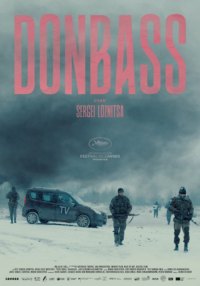
Leslie Felperin, The Hollywood Reporter про «Донбас» Сергія Лозниці.
Great visuals, but lacking in human warmth.
Sergei Loznitsa (‘A Gentle Creature’) depicts the war in eastern Ukraine through an ensemble drama that’s circular in structure.
The war in eastern Ukraine, a conflict that’s been raging since 2014 between Ukrainian government forces and pro-Russian, Putin-backed separatists, is evoked as an anarchic and absurdist horror show in writer-director Sergei Loznitsa’s powerful if ultimately enervating dramatic feature Donbass. Tackling a bloody struggle that these days barely registers in the media beyond the region itself, despite the fact that the shady Ukrainian connections to President Donald Trump and his cronies keep bobbing up in the news, the film feels timely and borne of deep-held despair at the senseless strife tearing the country apart.
That said, Loznitsa’s distinctive directorial style — an aesthetic less interested in characters and narrative than landscapes, fields of sound and amorphous yet eerily palpable atmospheres — risks creating a dry formalist exercise that’s hard to understand and engage with for non-Slavs or anyone averse to High Art House cinema. That intellectual, minimalist rigor has been bracing in his previous work, both the documentaries (Blockade, Maidan) and fictions (My Joy, In the Fog, A Gentle Creature), although this latest work is arguably his most dramatically coherent and accessible. Nevertheless, Donbass will face a battle to break out beyond the borders of festival programs and ultra-niche showcases.
Featuring an ensemble cast but following no single protagonist, the story is constructed like a daisy chain of interconnected scenes, or alternatively like an ouroboros (snake that eats itself) that ends, sort of, where it begins. The plot ambles hither and yon in in the eastern region of the title, an area bordering Russia that’s a literal frontline between the Ukrainian government, which looks towards Europe, and the insurgents, who have declared people’s republics in Donetsk and Luhansk that are heavily backed by Russian forces, money and totalitarian sympathies. But Loznitsa, who was born in Belarus, raised in Kiev and learned filmmaking in Russia, doesn’t oversimplify the political situation or even make any attempt to explain it for outsiders.
There are no white hats and black hats here, just a procession of soldiers in scrappy uniforms in various shades of camouflage, their tanks and outposts often draped by the Novorossiyan flag. Some speak Russian with more markedly Russian accents (as opposed to Ukrainian-Russian accents) than others. Indeed, when a German journalist tries to interview one Russian-speaking squad atop a tank, their smirking claims to be from “here” are greeted with skepticism by the journalist’s translator, the implication being that they are actually Russian nationals, parachuted into the insurgents’ midst to help serve the motherland’s interests. The Ukrainian forces are less visible, apart from one hapless captive (Valery Antoniuk) that a crowd of locals, head-scarfed grannies included, lynch when soldiers march him out to a nearby bus stop with a handwritten sign taped to his clothes claiming he’s a member of a Ukrainian execution squad.
However, be they soldiers or civilians, thugs or innocents, everyone is a possible target and potential casualty. Loznitsa adeptly evokes the unpredictability of war, with blasts and bombs going off suddenly in the middle of a scene, wiping out the characters suddenly to make way for the next scene. The point of view often mimics that of an ordinary citizen caught up in the mayhem via the use of handheld shots by acclaimed Romanian DP Oleg Mutu (he also lensed A Gentle Creature, as well as many of the key titles in the Romanian New Wave). For example, take the meta-ironic opening sequence, which features actors being made up for an upcoming scene (Tamara Yatsenko nags the makeup artist to lay the greasepaint on thick; her character is meant to have bags under her eyes). Suddenly, everyone in the room is herded out by a bossy assistant director who compels them to move as fast as possible, we assume so the film will stay on schedule. The sudden sound of a bomb blast offscreen undermines that assumption, although it’s never clear if the AD was shepherding the performers toward or away from the attack.
From there the action transitions to a local government assembly room where an angry woman (Olesya Zhurakovskaya) dumps a bucket of excrement over the head of a local official in protest over what she views to be a libelous story in the local paper. This nearly comic scene contrasts with the darker tone evoked in a tour of underground bomb shelters (once again, it’s as if you the viewer are the camera at which the actors look straight on). Huddled refugees sit in candlelight, starving and listless, breathing in damp air, mold and despair. It’s a powerful sequence, but you can’t help wondering if it might have been more powerful if we got to know some of these people more. Ultimately, Loznitsa builds up a portrait of a bitter clockwork world where the faces of the doomed are above all part of a landscape, lacking the joyful humanity that distinguished Elem Klimov’s 1985 war movie masterpiece, Come and See, an obvious touchstone here.
Venue: Cannes Film Festival (Un Certain Regard)
Production: A Ma.ja.de. Fiction in association with Arthouse Traffic, JBA Production, Graniet Film, Wild at Art, Digital Cube in co-production with Atoms & Void
Cast:Tamara Yatsenko, Liudmila Smorodina, Olesya Zhurakovskaya, Boris Kamorzin, Sergei Russkin, Petro Panchuk, Irina Plesnyaeva, Zhanna Lubgane, Vadim Dobuvsky, Alexander Zamurayev, Gerogy Deliev, Valeriu Andriuta
Director-screenwriter: Sergei Loznitsa
Executive producer: Heino Deckert
Co-producers: Jacques Bidou, Marianne Dumoulin, Marc van Warmerdam, Peter Warnier, Cristian Nicholescu
Associate producers: Sergei Loznitsa, Maria Choustova
Director of photography: Oleg Mutu
Production designer: Kirill Shuvalov
Costume designer: Dorota Roqueplo
Editor: Danielius Kokanauskis
Sales: Pyramide
121 minutes
Leslie Felperin, The Hollywood Reporter, 9 травня 2018 року
